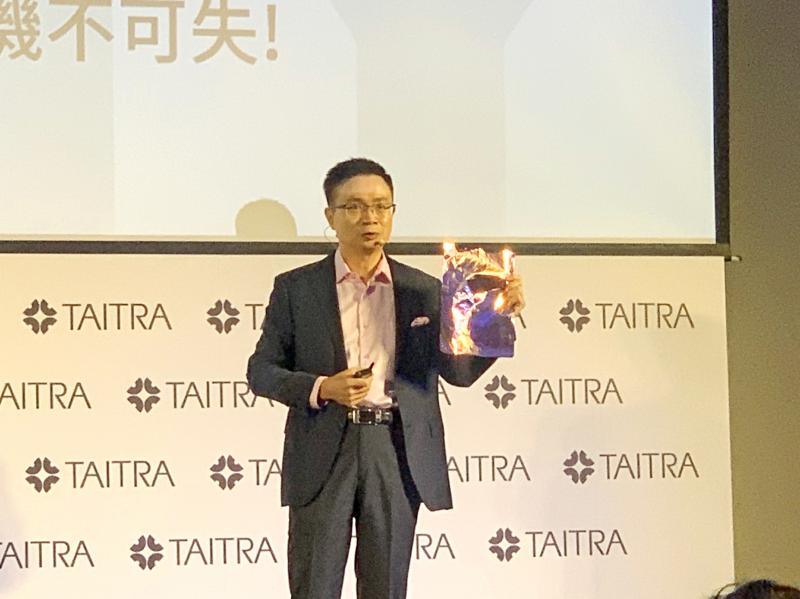Taiwan’s electric vehicle (EV) industry has “three years left” to build its own brand, Taiwan External Trade Development Council (TAITRA, 外貿協會) chairman James Huang (黃志芳) said at a news conference in Taipei yesterday, announcing that the council is to hold an electro-mobility trade show in October.
Although Taiwanese components make up about 75 percent of Tesla Inc’s vehicles, according to the Chinese-language Commonwealth Magazine, there are no Taiwanese EV brands on the market.
“We are looking ahead to 2035 because that is when many countries will be phasing out fossil fuel vehicles,” Huang said. “We all know that Taiwan is strong in EV hardware components, but until we have our own brand, we do not have a voice in the international market.”

Photo: Lin Jing-hua, Taipei Times
The council’s goal is to encourage local firms to build a “connected ecosystem centered on EV and autonomous-driving technology,” Huang said.
The first edition of the 2035 E-Mobility Taiwan Show would help to spark that development and feature local manufacturers and “international investors from Wall Street and Silicon Valley,” he said.
“Taiwan has the hardware supply chain and the software capability... The time has come to combine the two,” Huang said, adding that the nation has three years to “seize the opportunity.”
EVs have in the past few months been a hot topic in Taiwan, with Hon Hai Precision Industry Co (鴻海精密) in October last year announcing the launch of an open platform for EV development.
Hon Hai at the time said that it aims to secure 10 percent of the world’s EV market by 2025.
Hon Hai’s platform is “the Android of EVs,” Huang said, adding that the firm has been positive about participating in the e-mobility show.
In June, TAITRA would hold an “e-mobility demonstration day,” where start-ups and university research groups can demonstrate their projects, and compete for a chance to be included in the e-mobility show.
Huang said that the idea to host an e-mobility show came from Lin Shu-hong (林書鴻), chairman of Chang Chun Group (長春集團), a petrochemical conglomerate that produces copper foils, a vital component in EV batteries.
“Lin told me that the demand for copper foil is through the roof, thanks to demand from EV makers, and that we should build a ‘battery national team,’” Huang said. “Lin also predicts that the demand for lithium-ion batteries will be 28 times what it is today in 2030.”
“The nature of mobility is changing, and Taiwan must not miss this opportunity. The government must support the EV industry in the same way it supported the semiconductor industry in the past,” he said.

Among the rows of vibrators, rubber torsos and leather harnesses at a Chinese sex toys exhibition in Shanghai this weekend, the beginnings of an artificial intelligence (AI)-driven shift in the industry quietly pulsed. China manufactures about 70 percent of the world’s sex toys, most of it the “hardware” on display at the fair — whether that be technicolor tentacled dildos or hyper-realistic personalized silicone dolls. Yet smart toys have been rising in popularity for some time. Many major European and US brands already offer tech-enhanced products that can enable long-distance love, monitor well-being and even bring people one step closer to

TRANSFORMATION: Taiwan is now home to the largest Google hardware research and development center outside of the US, thanks to the nation’s economic policies President Tsai Ing-wen (蔡英文) yesterday attended an event marking the opening of Google’s second hardware research and development (R&D) office in Taiwan, which was held at New Taipei City’s Banciao District (板橋). This signals Taiwan’s transformation into the world’s largest Google hardware research and development center outside of the US, validating the nation’s economic policy in the past eight years, she said. The “five plus two” innovative industries policy, “six core strategic industries” initiative and infrastructure projects have grown the national industry and established resilient supply chains that withstood the COVID-19 pandemic, Tsai said. Taiwan has improved investment conditions of the domestic economy

Malaysia’s leader yesterday announced plans to build a massive semiconductor design park, aiming to boost the Southeast Asian nation’s role in the global chip industry. A prominent player in the semiconductor industry for decades, Malaysia accounts for an estimated 13 percent of global back-end manufacturing, according to German tech giant Bosch. Now it wants to go beyond production and emerge as a chip design powerhouse too, Malaysian Prime Minister Anwar Ibrahim said. “I am pleased to announce the largest IC (integrated circuit) Design Park in Southeast Asia, that will house world-class anchor tenants and collaborate with global companies such as Arm [Holdings PLC],”

MAJOR BENEFICIARY: The company benefits from TSMC’s advanced packaging scarcity, given robust demand for Nvidia AI chips, analysts said ASE Technology Holding Co (ASE, 日月光投控), the world’s biggest chip packaging and testing service provider, yesterday said it is raising its equipment capital expenditure budget by 10 percent this year to expand leading-edge and advanced packing and testing capacity amid strong artificial intelligence (AI) and high-performance computing chip demand. This is on top of the 40 to 50 percent annual increase in its capital spending budget to more than the US$1.7 billion to announced in February. About half of the equipment capital expenditure would be spent on leading-edge and advanced packaging and testing technology, the company said. ASE is considered by analysts